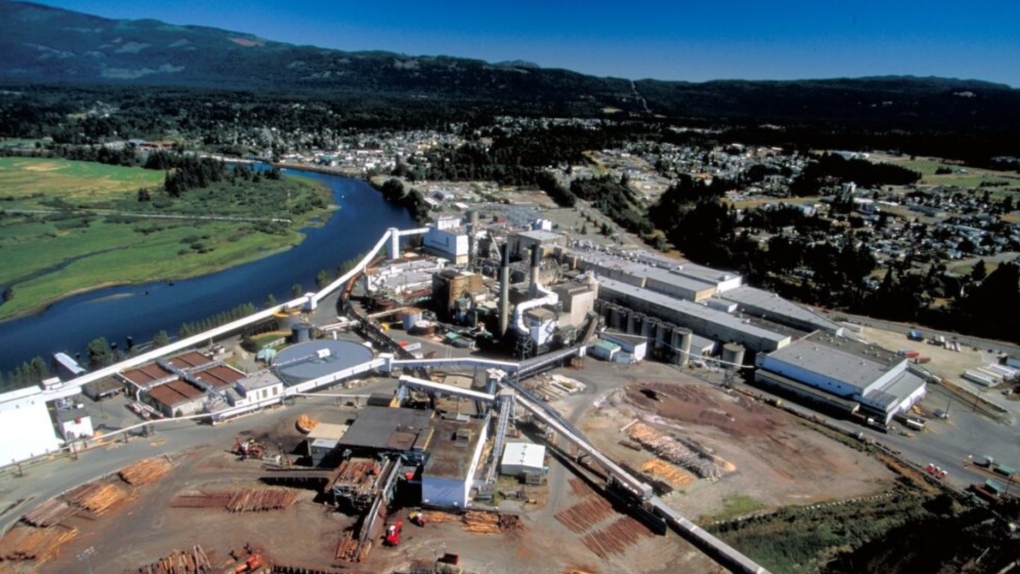Port Alberni mill receives $4.5M to begin producing food packaging
 The company says the investment will remove production bottlenecks and upgrade a pair of paper machines at the Port Alberni facility. (Paper Excellence)
The company says the investment will remove production bottlenecks and upgrade a pair of paper machines at the Port Alberni facility. (Paper Excellence)
A longstanding paper mill in Port Alberni, B.C., will begin making food grade paper for the first time in its decades-long history.
Since 1946, the Catalyst Port Alberni mill has produced mostly printing and writing grade paper.
However, the company says demand for those types of products has been steadily declining over the years.
"Transitioning to food grade papers means meeting growing market demand, providing sustainable alternatives to single-use plastic serving containers, and advancing B.C.’s circular economy," said Catalyst's parent company, Paper Excellence, in a release Wednesday.
The company adds that it will use a "unique" pulping technique that it developed that will reduce waste when making the new food packaging paper.
Paper Excellence is receiving $4.5 million from the federal government's Investments in Forest Industry Transformation (IFIT) program to update some if its equipment to make the new product.
IFIT is designed to provide capital funding to Canadian forestry companies to diversify the products and "ensure industry competitiveness," according to Paper Excellence.
The Catalyst Port Alberni mill employs 310 people full time on Vancouver Island, according to the company, which says the mill also creates 800 indirect jobs in B.C.
The mill also contributes $500 million to the B.C. economy annually, and pays about $4.1 million in local taxes each year, the company says.
CTVNews.ca Top Stories

Most polls closed in Nova Scotia election; results delayed by an hour
Nova Scotians cast their votes Tuesday in a snap provincial election, but they won't learn the outcome until after 9 p.m., due to a delayed opening at a polling station.
Paul Bernardo denied parole after victims' families plead he be kept behind bars
Notorious killer and rapist Paul Bernardo has been denied parole for a third time after the families of his victims made an emotional plea to the Parole Board of Canada on Tuesday to keep him behind bars.
Loonie tanks after Trump threatens tariffs on Canadian goods
The Canadian dollar fell to its lowest level since May 2020 after Donald Trump threatened to impose tariffs on Canadian goods shipped to the United States once he takes office in January.
'We need to address those issues': Alberta Premier Danielle Smith won't denounce Trump tariff threat
Alberta Premier Danielle Smith says Canada should address U.S. president-elect Donald Trump's border concerns in the next two months, before he's back in the White House, instead of comparing our situation to Mexico's and arguing the tariff threats are unjustified.
Should Canada retaliate if Trump makes good on 25 per cent tariff threat?
After U.S. president-elect Donald Trump threatened to impose a 25 per cent tariff on all Canadian imports on his first day back in the White House unless his border concerns are addressed, there is mixed reaction on whether Canada should retaliate.
Biden says Israel-Hezbollah ceasefire will take effect Wednesday morning
A ceasefire between Israel and Lebanon's Hezbollah will take effect on Wednesday after both sides accepted an agreement brokered by the United States and France, U.S. President Joe Biden said on Tuesday.
Longtime member of Edmonton theatre community dies during 'A Christmas Carol' performance
Edmonton's theatre community is in mourning after an actor died during a performance of "A Christmas Carol" at the Citadel Theatre on Sunday.
'We need to do better': Canadian leaders respond to Trump's border concerns
As U.S. president-elect Donald Trump threatens Canada with major tariffs, sounding alarms over the number of people and drugs illegally crossing into America, Conservative Leader Pierre Poilievre and some premiers say they agree that more could be done.
As Trump vows major tariff hike, a look at what the U.S. imports from Canada
Some Canadian products could face huge tariffs on the first day of Donald Trump's administration in January. Here’s a quick look at what the U.S. imports from Canada.

































